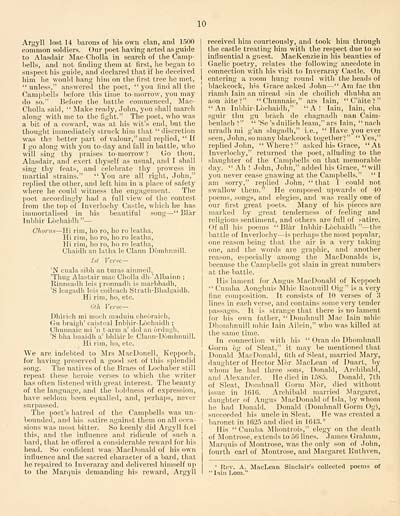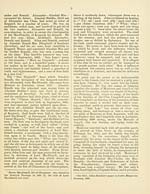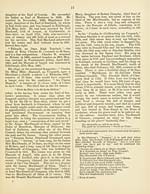Download files
Complete book:
Individual page:
Thumbnail gallery: Grid view | List view

Argyll lost 14 barons of his own clan, and 1500
common soldiers. Our poet having acted as guide
to Alasdair Mac-Cholla in search of the Camp-
bells, and not finding them at first, lie began to
suspect his guide, and declared that if he deceived
him he would hang him on tiie tirst tree he met,
" unless," answered the poet, " you lind all the
Campbells before this time to-morrow, you may
do so." Before the battle commenced, Mac-
Cholla said, " Make ready, John, you shall march
along witli me to the light." The poet, who was
a bit of a coward, was at his wit's end, but the
thought immediately struck him tliat "discretion
was the better part of valour," and replied, " If
I go along with you to-day and fall in battle, who
will sing thy praises to-morrow? Go thou,
Alasdair, and exert thyself as usual, and I shall
sing thy feats, and celebrate thy prowess in
martial strains." "You are all right, John,"
replied the other, and left him in a place of safety
where he could witness the engagement. The
poet accordingly liad a full view of the contest
from the top of Inverlochy Castle, which he has
immortalised in his beautiful song — " Blàr
Inbhir Lòchaidh"—
Chornn—ìii rim, ho ro, ho ro leatha,
Hi rim, ho ro, ho ro leatha.
Hi rim, ho ro, ho ro leatha,
Chaidh an lalha le Clann Dòmhnuill.
U l-er.se-
'Ncualasil,h an turns aiiuìK'iI,
Thu- Alastair mac Clu.lla dli-'Albainn ;
Rinnuadh leis i r.,nna(lli is mailihadh,
'S leugadh Icis coilracli «lralli-Bha]gaidh.
Hi rim, ho, etc.
(!fh Verse-
Dhirioh mi mocli maduin cheòraieh,
(jru braigh' caisteal Inbhir-Lòchaidh ;
Chunnaic mi 'n t-arm a' dol an òrdugh,
'S bha buaidh a' bhlàir Ic Clann-Dòmhnuill.
Hi rim, ho, etc.
We are indebted to Mrs MacDonell, Keppoch,
for having preserved a good set of this splendid
song. Tlie natives of the Braes of Lochaber still
repeat tiiese iieroic verses to which the writer
has often list (Mied with great interest. The beauty
of the language, and the boldness of expression,
lia\e seldom been equalled, and, perhaps, never
surjiassed.
The poet's hatred of the Campbells was un-
bounded, and his satire against them on all occa-
sions was most bitter. So keenly did Argyll ftel
this, and the influence and ridicule of such a
bard, that he offered a considerable reward for his
head. So confident was MacDonald of his own
influence and the sacred character of a bard, that
he repaired to Inveraray and delivered himself u)!
to the Marquis demanding his reward, Argyll
received him courteously, and took him through
the castle treating him with the respect due to so
influential a guest. MacKenziein his beauties of
Gaelic poetry, relates the following anecdote in
connection with his visit to Inveraray Castle. On
entering a room hung round with the heads of
blackcock, his Grace asked John — " Am fac thu
riamh Iain an uiread sin de choilich dhubha an
aon àite?" "Chunnaic," ars Iain, "C'àite?"
"An Inbhir-LiK'haidh," "A! Iain, Iain, cha
sguir thu gu biacli de chagnadh nan Caim-
beulach ?" " Sc s iluili<'li leam," ars Iain, " nach
urradh mi g'an sluga<lli," i.e., " Have you ever
seen, John, so many blackcock together?" "Yes,"
replied John, "Where?" asked his Grace, "At
Inverlochy," returned the poet, alluding to the
slaughter of the Campbells on that memorable
day. " Ah ! John, John," added his Grace, "will
you never cease gnawing at the Campbells." " I
am sorry," replied John, " that I could not
swallow them." He composed upwards of 40
poems, songs, and elegies, and was really one of
our first great poets. Many of his pieces are
marked by great tenderness of feeling and
religious sentiment, and others are full of t-atire.
Of all his poems " Bl;\r Inbhir-Lòehaidh " — the
battle of Inverlochy — is perhaps the most popular,
one reason being that the air is a very taking
one, and the words are graphic, and another
reason, especially among the MacDonalds is,
because the Campbells got slain in great numbers
at the battle.
His lament for Angus MacDonald of Keppoch
" Cumha Aonghuis Mhic Raonuill Oig" is a very
line composition. It consists of 10 verses of 3
lines in each verse, cand contains some very tender
passages. It is strange that there is no lament
for his own father, " Domhnull Mac Iain mhic
Dhomhnuill mhic Iain Ailein," who was killed at
the same time.
In connection with his " Oran do Dhomhnall
Gorm òg of Sleat," it may be mentioned that
Donald MacDonald, 6th of "Sleat, married Mary,
daughter of Hector Alòr MacLean of Duart, by
whom he had three sons, Donald, Archibald,
and Alexander. He died in 1585. Donald, 7th
of Sleat, Domhnall Gorm Mòr, died without
issue in 1616. Archibald married Margaret,
daughter of Angus MacDonald of Isla, by whom
he had Donald. Donald (Domhnall Gorm Og),
succeeded his uncle in Sleat. He was created a
baronet in 1625 and died in 1643.*
His "Cumha Mhontiois," elegy on the death
of Montrose, extends to 5G lines. James Graham,
Marcjuis of Montrose, was the only son of John,
fourth earl of Montrose, and Margaret Kuthven,
common soldiers. Our poet having acted as guide
to Alasdair Mac-Cholla in search of the Camp-
bells, and not finding them at first, lie began to
suspect his guide, and declared that if he deceived
him he would hang him on tiie tirst tree he met,
" unless," answered the poet, " you lind all the
Campbells before this time to-morrow, you may
do so." Before the battle commenced, Mac-
Cholla said, " Make ready, John, you shall march
along witli me to the light." The poet, who was
a bit of a coward, was at his wit's end, but the
thought immediately struck him tliat "discretion
was the better part of valour," and replied, " If
I go along with you to-day and fall in battle, who
will sing thy praises to-morrow? Go thou,
Alasdair, and exert thyself as usual, and I shall
sing thy feats, and celebrate thy prowess in
martial strains." "You are all right, John,"
replied the other, and left him in a place of safety
where he could witness the engagement. The
poet accordingly liad a full view of the contest
from the top of Inverlochy Castle, which he has
immortalised in his beautiful song — " Blàr
Inbhir Lòchaidh"—
Chornn—ìii rim, ho ro, ho ro leatha,
Hi rim, ho ro, ho ro leatha.
Hi rim, ho ro, ho ro leatha,
Chaidh an lalha le Clann Dòmhnuill.
U l-er.se-
'Ncualasil,h an turns aiiuìK'iI,
Thu- Alastair mac Clu.lla dli-'Albainn ;
Rinnuadh leis i r.,nna(lli is mailihadh,
'S leugadh Icis coilracli «lralli-Bha]gaidh.
Hi rim, ho, etc.
(!fh Verse-
Dhirioh mi mocli maduin cheòraieh,
(jru braigh' caisteal Inbhir-Lòchaidh ;
Chunnaic mi 'n t-arm a' dol an òrdugh,
'S bha buaidh a' bhlàir Ic Clann-Dòmhnuill.
Hi rim, ho, etc.
We are indebted to Mrs MacDonell, Keppoch,
for having preserved a good set of this splendid
song. Tlie natives of the Braes of Lochaber still
repeat tiiese iieroic verses to which the writer
has often list (Mied with great interest. The beauty
of the language, and the boldness of expression,
lia\e seldom been equalled, and, perhaps, never
surjiassed.
The poet's hatred of the Campbells was un-
bounded, and his satire against them on all occa-
sions was most bitter. So keenly did Argyll ftel
this, and the influence and ridicule of such a
bard, that he offered a considerable reward for his
head. So confident was MacDonald of his own
influence and the sacred character of a bard, that
he repaired to Inveraray and delivered himself u)!
to the Marquis demanding his reward, Argyll
received him courteously, and took him through
the castle treating him with the respect due to so
influential a guest. MacKenziein his beauties of
Gaelic poetry, relates the following anecdote in
connection with his visit to Inveraray Castle. On
entering a room hung round with the heads of
blackcock, his Grace asked John — " Am fac thu
riamh Iain an uiread sin de choilich dhubha an
aon àite?" "Chunnaic," ars Iain, "C'àite?"
"An Inbhir-LiK'haidh," "A! Iain, Iain, cha
sguir thu gu biacli de chagnadh nan Caim-
beulach ?" " Sc s iluili<'li leam," ars Iain, " nach
urradh mi g'an sluga<lli," i.e., " Have you ever
seen, John, so many blackcock together?" "Yes,"
replied John, "Where?" asked his Grace, "At
Inverlochy," returned the poet, alluding to the
slaughter of the Campbells on that memorable
day. " Ah ! John, John," added his Grace, "will
you never cease gnawing at the Campbells." " I
am sorry," replied John, " that I could not
swallow them." He composed upwards of 40
poems, songs, and elegies, and was really one of
our first great poets. Many of his pieces are
marked by great tenderness of feeling and
religious sentiment, and others are full of t-atire.
Of all his poems " Bl;\r Inbhir-Lòehaidh " — the
battle of Inverlochy — is perhaps the most popular,
one reason being that the air is a very taking
one, and the words are graphic, and another
reason, especially among the MacDonalds is,
because the Campbells got slain in great numbers
at the battle.
His lament for Angus MacDonald of Keppoch
" Cumha Aonghuis Mhic Raonuill Oig" is a very
line composition. It consists of 10 verses of 3
lines in each verse, cand contains some very tender
passages. It is strange that there is no lament
for his own father, " Domhnull Mac Iain mhic
Dhomhnuill mhic Iain Ailein," who was killed at
the same time.
In connection with his " Oran do Dhomhnall
Gorm òg of Sleat," it may be mentioned that
Donald MacDonald, 6th of "Sleat, married Mary,
daughter of Hector Alòr MacLean of Duart, by
whom he had three sons, Donald, Archibald,
and Alexander. He died in 1585. Donald, 7th
of Sleat, Domhnall Gorm Mòr, died without
issue in 1616. Archibald married Margaret,
daughter of Angus MacDonald of Isla, by whom
he had Donald. Donald (Domhnall Gorm Og),
succeeded his uncle in Sleat. He was created a
baronet in 1625 and died in 1643.*
His "Cumha Mhontiois," elegy on the death
of Montrose, extends to 5G lines. James Graham,
Marcjuis of Montrose, was the only son of John,
fourth earl of Montrose, and Margaret Kuthven,
Set display mode to: Large image | Transcription
Images and transcriptions on this page, including medium image downloads, may be used under the Creative Commons Attribution 4.0 International Licence unless otherwise stated. ![]()
| Early Gaelic Book Collections > Ossian Collection > Macdonald bards from mediaeval times > (20) |
|---|
| Permanent URL | https://digital.nls.uk/80460641 |
|---|
| Description | Selected books from the Ossian Collection of 327 volumes, originally assembled by J. Norman Methven of Perth. Different editions and translations of James MacPherson's epic poem 'Ossian', some with a map of the 'Kingdom of Connor'. Also secondary material relating to Ossianic poetry and the Ossian controversy. |
|---|
| Description | Selected items from five 'Special and Named Printed Collections'. Includes books in Gaelic and other Celtic languages, works about the Gaels, their languages, literature, culture and history. |
|---|

